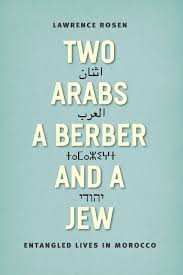Writing anthropological and ethnographic research can be quite challenging. The experiences are so rich that one may not know where to begin and where to end. In "Two Arabs, A Berber and a Jew: Entangled Lives in Morocco" (2016), Lawrence Rosen provides an exemplary model for anyone grappling with these questions. To do so, he draws on experiences in Morocco over a period of nearly sixty years. The book weaves in a diverse set of literature, from history to political science and works of fiction. Many books are biographical in nature, and at first glance this book might appear to be the story of four lives, which is partly is. However, the author uses these stories to tell other stories (the first delves into Moroccan history, the second a sort of Moroccan cultural Islam 101, the third and fourth cover the lives and experiences of Berbers and Jews). For anyone interested in Morocco, this is an excellent book. And, for anyone interested in how good anthropological and ethnographic research can be made accessible to a broader readership, this is an important read.
What one "feels" as a reader, is Rosen's deep respect for the people with whom he interacts. It is not easy to convey this (although the contrary is easy). For example, he opens the book by stating: "Ordinary people have intellectual lives. They may never have written a book; they may never even have read one. But their lives are rich in ideas, constantly fashioned and revised, elaborated and rearranged." (xi) Small comments throughout give one the sense of the authors love, appreciation, and respect for the people of Morocco. This might be common amongst anthropologists, but difficult to convey in academic works such as this (published by a university press; it, however, lacked in-text references in a number of places, including for direct quotes, which was not expected of such a publication).
Rosen also speaks about, and back to the discipline of Anthropology, throughout. I found these additions quite insightful, and coming from a seasoned anthropologist, quite informative. For example: "Anthropologists, Levi-Strauss once quipped, are radicals at home and conservatives abroad. Whether as the perpetrators or the victims of functionalism - a theory that emphasizes the contribution of each element to the continued working of a whole society but that, as a result, has always had trouble with accounting for change - we anthropologists often have to make a real effort when we study others to note the alterations such theories may obscure. And, wary of appearing judgmental, we often avoid discussions of discontinuities unless we can imagine ourselves allied with the politically correct side in the equation of power. Morocco in particular may not seem to lend itself to a focus on discontinuity. Instead it seems to embrace the continuous - one king for decades, one dynasty for centuries, one religion for millennia. It sometimes becomes an exercise in pressing the limits of predilection and profession, then, to attend to change when neither the subject nor the theories are altogether hospitable to it." (p. 231)
I was recently listening to a Professor in Ethiopia, who explained that often we miss some of the socio-cultural aspects which limit or enable opportunities. In that case, that while opportunities might be granted to certain people, they may not be able to benefit by them is the broader society refuses to purchase from them. A few lines from Rosen also reflected some of this socio-cultural complexity. For example, in a "list of occupations practiced by Muslims and Jews in Sefrou in 1924 is instructive in this regard. Note that all of the tinsmiths and porters, for example, were Jews. This, older Muslims told me, was because the tinsmiths were also plumbers and had to enter a Muslim's house where they would see the women and belongings of the homeowner. But whereas the Muslims were not eager for fellow Muslims to see such things in their homes, the Jews could be expected to remain discreet and, since they were not potential martial partners or political allies, their knowledge of one's household situation was not going to bear on subsequent relationships." (p. 290)

